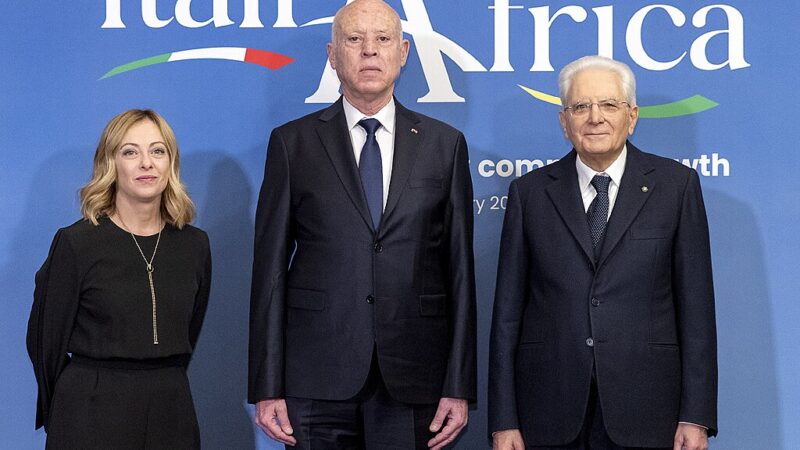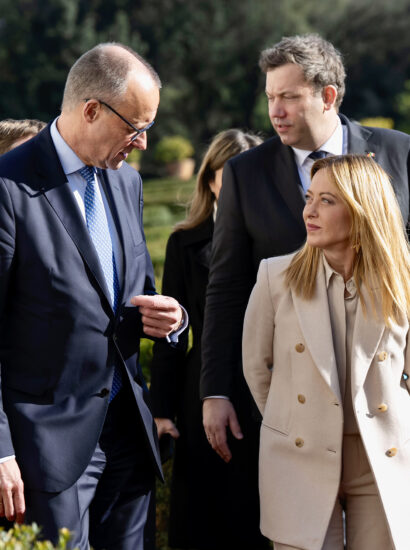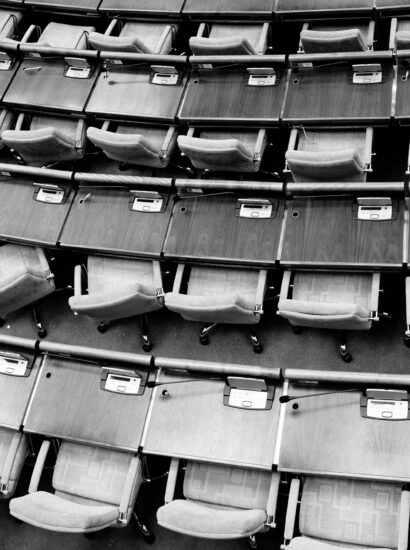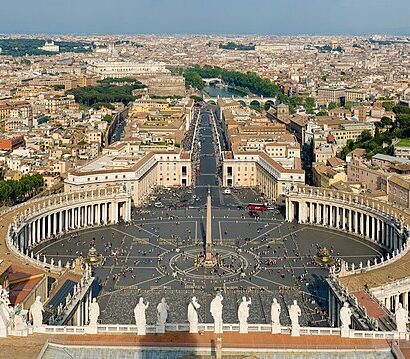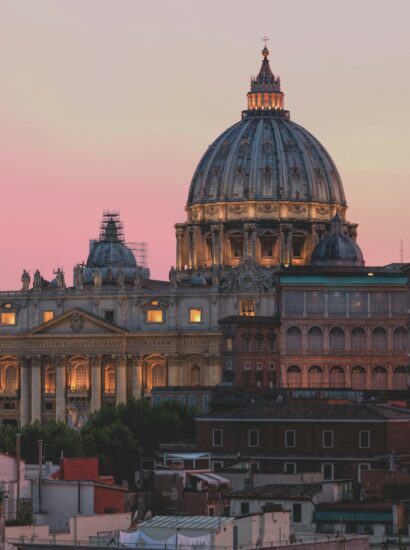This year has been full of success for Italy’s Prime Minister Giorgia Meloni. After the European Elections, she emerged as a “kingmaker” holding the balance of power between the center-right and far-right groupings in the European Parliament, where her part quadrupled their seats what it took in the last election, now expected to get 24.
At the home front, a year and a half into her tenure, Meloni maintains strong approval ratings. She faces no real threats from the opposition or her coalition partners (mainly Deputy Prime Minister Matteo Salvini). Although more confrontational tones emerged from within the ruling coalition at times, especially on some reforms and policies under discussion at the EU level, the would-be rivals of Meloni’s Brothers of Italy party all have been outflanked.
Domestic Stability – Increased Opportunity Abroad
The majority of Italian policymakers agree with Meloni’s foreign policy priorities, which align with transatlantic ones. Meloni, who was first seen as a potential weak point in the European Union, has proven to be an ardent supporter of Ukraine. While not anti-EU, she is a skeptic of the EU.
Italy’s government can make a far more significant impact overseas thanks to uncommon, unquestioned leadership and support for its foreign policy priorities. This stability arrives at a perfect moment. In 2024, Italy will preside over the G7. In July, Ursula von der Leyen, the president of the European Commission, signed a migration agreement that Meloni and Dutch Prime Minister Mark Rutte had negotiated with Tunisia.
Overall, the foreign policy pursued by the Italian government was pragmatic and aligned with the country’s traditional orientations. The Meloni government confirmed the steady support for Ukraine against Russia’s aggression and further strengthened its relations with the US; in parallel, it withdrew from the Memorandum of Understanding on the Belt and Road Initiative (BRI) that had been signed in 2019, although the decision was made public in a rather subdued way in order not to compromise the overall relationship with Beijing.
Migration and energy partnerships were the two major concerns in relations with the MENA region, while the contours of the so-called “Mattei Plan for Africa” remained vague.
Grand Strategy for Africa
In January this year, Meloni unveiled the Mattei Plan for North Africa, which is also an infrastructure pillar of her foreign policy. The €5.5 billion plan aims to assist African nations in creating domestic stability to reduce migration abroad.
Given that Italy continues to be a crucial point of entry from North Africa, the plan aims to help African countries build stability at home to limit migration abroad.
Second, the strategy seeks to strengthen the economic ties between Europe and Africa by positioning Italy as a hub for European energy. Third, the plan is part of the G7’s broader endeavor to demonstrate the viability of the West’s rules-based system and to counter China’s influence through a framework of genuinely nonexploitative partnerships. Fourth, the twin transitions to digital and green will depend heavily on African states that are rich in minerals.
Italy’s comprehensive African strategy carries the name of Enrico Mattei, the company founder, who was instrumental in transforming Eni into a global energy giant following World War II.
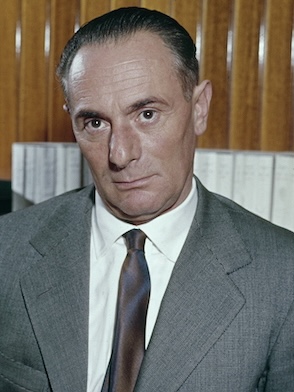
Enrico Mattei 1950
Photo: l’industriale Enrico Mattei alla sua scrivania
(Source: Wikipedia)
As Marco Giuli, an analyst from the European Policy Centre in Brussels, emphasized, “the plan’s central idea is energy cooperation with North African countries to support broader Italian interests in the region, ranging from migration to the containment of destabilizing influences.”
Given that Rome was heavily dependent on Russian gas, energy security is more crucial now that Russia has invaded Ukraine on a large scale. Since Meloni committed to making a change, the nation’s imports of Russian gas have been reduced by more than half. A new electricity connector connecting Tunisia and Sicily is under construction. The proposed interconnector, which the EU funds, also symbolizes Italy’s renewed emphasis on more profound and complex partnerships with its neighbors as well as its pursuit of energy autonomy.
Besides being a successful manager, Mattei was a prominent member of the Italian Christian Democratic Party and a strong proponent of the idea that political independence could not exist without energy autonomy. Italy’s standing abroad was elevated by Mattei, known as the “miracle man,” and Meloni now hopes that his memory will once more perform its magic.
The Economic Means of the Plan
Italy’s interest in the Mediterraneo Allargato (the Italian phrase for the Enlarged Mediterranean) is not new; the country’s aspiration to become the link between Europe, Africa, and the Near East has been a longtime aspiration.
To promote Italy’s role as a regional power, Meloni and her Foreign Minister, Antonio Tajani, conducted several diplomatic missions to the MENA region: In January 2023, the two of them paid a visit to Algiers, and Tajani traveled to Turkey (also in January and to Egypt (in March). The diplomatic delegation to Algeria had been complemented with Claudio Descalzi, the CEO of Eni, as an excellent example of “Mattei tradition”. The visit to Algiers follows those made by President Sergio Mattarella and former Prime Minister Mario Draghi. In her meeting with the Algerian President, Abdelmadjid Tebboune Meloni signed a landmark deal to increase the gas import from the North African country, furthermore they agreed on a creation of a new hydrogen pipeline. Algeria is by far Italy’s largest natural gas supplier, with 25 billion cubic meters of gas supplied in 2022, but historically it is also one of its most loyal allies.
Due to the expansion in hydrocarbon supplies (worth 18 billion euros), bilateral trade in 2022 reached 20.5 billion euros compared to 7.8 billion euros in 2021, positioning Algeria as Italy’s second-largest trade partner in the wider Mediterranean after Turkey (25.6 billion euros).
Tajani’s missions to Turkey and Egypt tried to find a convergence to favor the stabilization of Libya and also concerned energy investments. Following her visit to Algeria, Meloni also traveled to Tripoli, where she met with the head of Libya’s Government of National Unity. During the visit, the chiefs of Eni and Libya’s National Oil Corporation signed a 25-year-long gas investment deal worth $8 billion to develop two offshore platforms and a carbon capture and sequestration plant.
Combating Migration
Another key player in the region for Italian ambitions is President Kais Saied, the Tunisian president to whom Meloni met at least four times during her tenure. On the one hand, the Transmed gas pipeline passes through Tunisia, bringing the majority of imported methane to Italy.
On the other hand, the country is also a key partner in controlling the migration flow. Tunisia is one of the three main countries in the Mediterranean from where people start their journey to the Italian shores. According to Italian Interior Ministry figures, more than 16 000 migrants arrived in Italy by small boats from Libya, Algeria, and Tunisia between January and mid-April this year.
In April, Meloni signed three agreements with Tunisia during her fourth official state visit to the North African country. “Collaboration with Tunisia is absolutely a priority for Italy from many points of view and it is also a piece of the work that Italy is carrying out with the Mattei Plan,” said the Prime Minister.
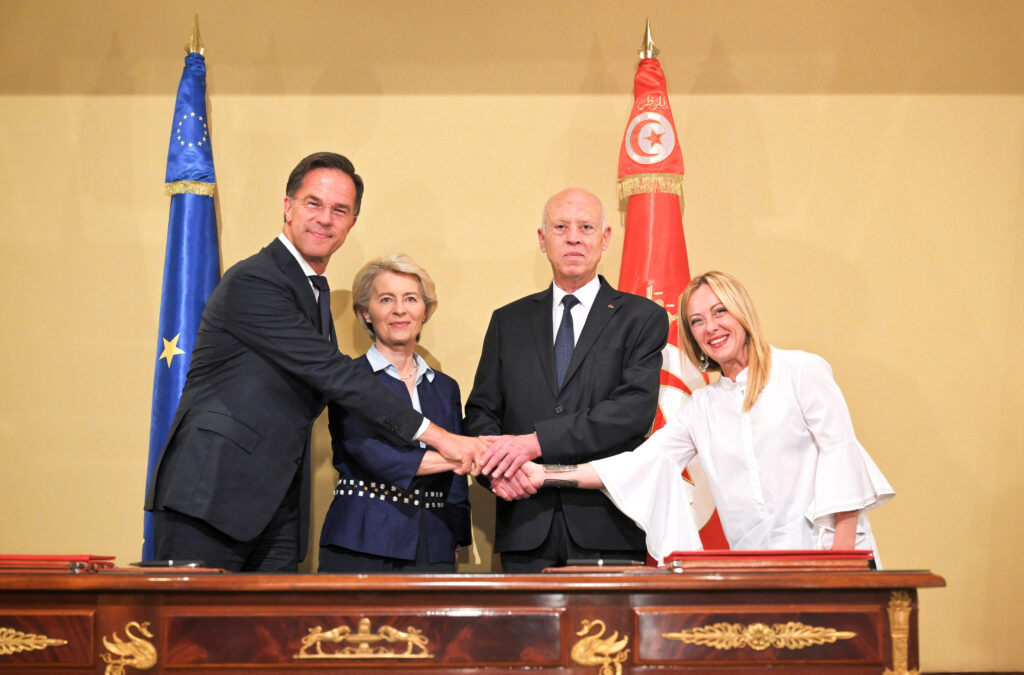
Kaiss Saied with Ursula von der Leyen, Giorgia Meloni and Mark Rutte, in July 2023 (Source: Wikipedia.com)
The agreements totaling €100 million were signed covering three areas: direct budget support for Tunisian state efficiency in energy and renewable energies, a credit line for Tunisian small and medium enterprises, and a memorandum of understanding. Before that, Meloni – joined by then Dutch Prime Minister Mark Rutte – also negotiated a migration agreement with Tunisia, signed by European Commission President Ursula von der Leyen in July 2023. The migratory control delegated to Tunisia in a July 2023 memorandum, presented by Meloni when it was signed as “a model for the establishment of new relations with North Africa” and since duplicated with Egypt and soon Mauritania, now seems fragile.
The Future of Mattei Plan
The Italian reorientation in energy matters should not, however, be seen as a true revision of Italian foreign policy. With its G7 presidency, Italy should focus on deepening the coordination of projects such as the G7 PGII initiative and the EU’s Global Gateway. Nevertheless, the Mediterranean is not Rome’s only geopolitical focus. Italy also hopes to connect its maritime basin to the Indo-Pacific along the southern corridor, outside of the Chinese Belt and Road Initiative. Meloni seems to be running along the same track as her predecessor Mario Draghi, to whom we also owe Italy’s strongly Atlanticist posture in the Russia-Ukraine war, which in turn has allowed Italy to enjoy the political legitimacy needed to act as a bulwark of European energy interests in Central Mediterranean. Although the current political calm won’t last forever, in this period of steadiness at home, Rome can expand its leadership role abroad.

